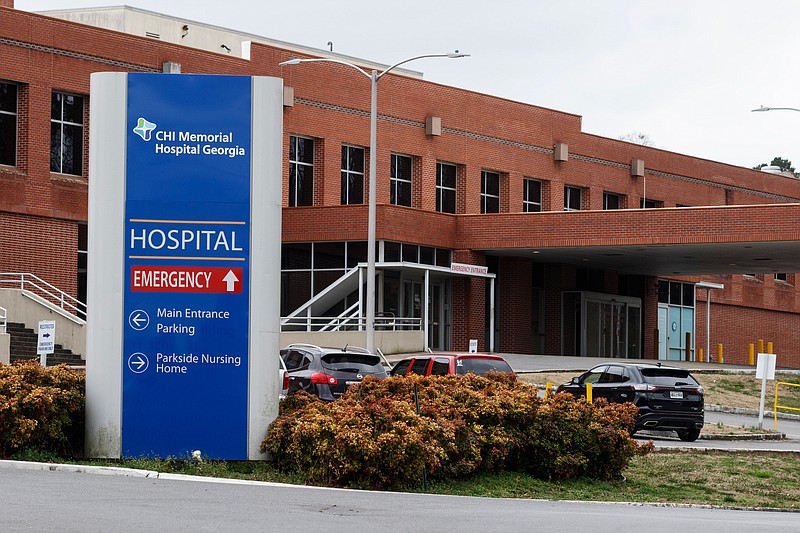House Bill 198 would:
Remove restrictions on building new health care facilitiesRequire nonprofit hospitals to reveal financial informationAdd $40 million to the rural hospital tax credit programRequire hospitals provide certain levels of charity care
Some Georgia lawmakers have reignited a heated debate over health care regulations with an 83-page bill that could dramatically reshape the state's health care system.
If passed, House Bill 198 would replace the controversial certificate of need - commonly called CON - program with a more relaxed licensure program, allowing any health care provider with the exception of certain long-term care facilities to duplicate services that already exist in an area without proving there's a "need."
"A lot of the current CON process involves expense and time that does nothing to help the actual health of the community," the bill's co-sponsor Rep. Terry England, R-Auburn, said during a special committee meeting Wednesday. "Our endgame here is to do what's best for the patient, and what's best for the patient is access, affordability and quality."
Supporters of the bill believe removing cumbersome regulations will free the health care industry, bringing more providers into the market to drive competition and lower costs. But opponents, including the heavyweight Georgia Hospital Association, say scrapping the CON program would be detrimental to a fragile ecosystem in which seven rural hospitals in the state have closed since 2010.
Andrew McGill, vice president of strategy and business development at CHI Memorial, said he wants the North Georgia community to understand the proposed legislation.
"All of us in this business are following this because of the implications," McGill said.
While he believes the regulatory process should be modernized, McGill said the bill in its current form would leave Memorial's Georgia hospital in Fort Oglethorpe, which is classified by the state as a rural hospital, especially vulnerable.
"We're trying to bring back a hospital that went bankrupt. We know that area needs hospital care," he said. "This bill will severely hinder our ability to give access it would knock all the barriers to entry down for those whose sole purpose for being in this business is a profit."
McGill said "what often gets lost" in the free market health care debate is that hospitals are required to treat patients regardless of their ability to pay.
"Hospitals have to be comprehensive in their provision of services," he said. "That's everything from the [emergency department] all the way to the process of being admitted, tests, labs, surgery, inpatient care, and they're available 24-7."
When others come into a hospital's territory to compete on niche services - surgery centers, cancer centers, imaging centers - that leaves the hospital with the rest, McGill said.
"No one competes for Medicaid or the uninsured," he said. "Hospitals exist to take care of the community. A competitor that comes in and takes the paying customer away only harms the hospital and its mission."
Now, when a medical provider wants to open a new facility, such as a hospital, freestanding emergency department or surgery center, under Georgia law they must first convince regulators at the Georgia Department of Community Health that the facility is needed. Aspiring providers compile detailed reports using demographic and disease data to paint a picture of the population and its needs with the hopes of gaining permission to go ahead with the project.
"Certificate of need lays out a thoughtful planning process that is intended to ensure the orderly development of health care resources, driven by data that informs everyone as to thoughtful decision making," McGill said.
Certificate of need laws were created in 1964 to control health care costs by preventing unnecessary duplication of services, but state Rep. Matt Hatchett, R-Dublin, co-sponsor of the bill, said Wednesday that the process isn't working.
"We're fighting every day to reduce the cost of our health care the prices that we continue to pay are not going down," Hatchett said.
Today, 35 states - including Tennessee - maintain some form of CON program, according to the National Conference of State Legislatures website.
During a three-hour legislative hearing Thursday, Rep. Sharon Cooper, vice chairwoman of Georgia's special committee on access to quality health care, railed against hospitals for using the law to block competitors.
"What really bothers me about the CON laws is how much money the hospitals spend fighting each other over these laws when they could be spending that on patient care," Cooper said.
During much of last year, Memorial and Erlanger Health System vied for certificates of need to build freestanding ambulatory surgery centers and radiation centers in Ringgold. The regulatory battle culminated when Memorial launched an online campaign to rally the community against Erlanger, claiming Erlanger would use the facilities to funnel patients away from North Georgia and into Chattanooga.
House Bill 198 would prohibit these objections to licensure applications unless the proposed service is outside the Metro Atlanta area and within 10 miles of a facility providing the same services. It also would expand open records law for all nonprofit hospitals.
"There is a concern that many of your nonprofit hospitals - not all - are under a veil or cloak that we can't see where the money is being spent and what they're doing with it," Hatchett said. "Because they are receiving funds and because they are not paying all of the taxes that for-profit entities pay, let's make this information easily accessible."
McGill said he doesn't mind the transparency provision.
"The main thing we adamantly oppose is throwing out the CON completely," he said. "It was truly a surprise how blunt this legislation is. It got our attention."
Contact staff writer Elizabeth Fite at efite@timesfreepress.com or 423-757-6673.

